|
This means old economy to analysts
at the Financial Post, Financial Times, Barron's, and CNBC of course,
to name only the few we've come across recently. I'm certain you've
seen the same label applied to this market in almost every newspaper
that deals with the subject of finance.
At least it involves some kind of
logic, even if suspect. This way we can say that anything that goes
up a lot is the New Economy, and anything that goes down a lot and
for several years is part of the Old Economy.
Aside from the fallacy of arbitrarily
labeling assets as if they were going to be thrown into a catalogue,
nothing else they usually say makes much, if any, sense.
In one comment, it was said that
although gold shares rose strongly last year, since they've got
such a long way to go to recoup the past five year's worth of losses,
you might as well toss any buying ideas out of the window. There
is a reason they went down you see, for they're part of the old
economy.
You can get advice like this from
most newspapers today. It may cost more than the Goldenbar Report
(nudge, nudge), in many ways, but at least you'd be thinking what
everybody else is, and you'd be looking in the rear view mirror
like everybody else. Heck, you'd fit right in.
However, the truth is that just five
years ago, gold shares were making new highs in a primary bull market,
despite just a steady gold price.
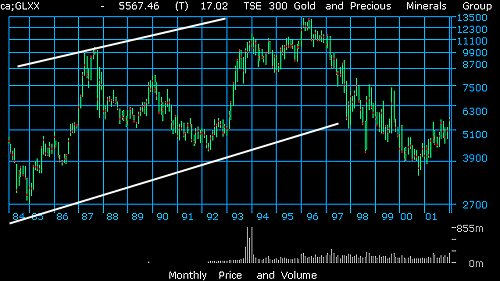
Are we going to assume that anything
that has been going down since 1997 then is part of the Old World?
What happened after this period of time that transformed the entire
monetary world, and freed it from the shackles of history? Sure
technological advance to an extent may have accelerated, but nothing
was invented to replace the traditional role of money, unless the
market suddenly chooses Semiconductor Chips as its sovereign medium
of exchange.
If anything, the rapid advance in
information technology is helping more investors understand the
complex nature of money, which is why gold and gold shares may in
fact now be turning around.
I am willing to bet that after five,
or perhaps more, bad years in the broad stock market, just before
stock prices turn higher, most of the world will hate stocks. Reporters
will be pointing at the downtrend and reporting that the world is
going to end, just like they did in 1990 when they sulked about
high valuations in the stock market (and after the stock market
crash of 1987) not recognizing that earnings had troughed and that
some right steps were being made in Corporate America to bring them
back.
I remember Citigroup's balance sheet,
and it was ugly, so everybody hated the stock. They hated all the
bank stocks.
The stock rallied fifteen fold over
the next ten years. FIFTEEN-FOLD. And it all started with a bad
balance sheet. Today they hate Newmont's balance sheet. Every analyst
on the street tells you that they think Newmont's balance sheet
after its merger will look terrible. Yet at the very height of the
1996 bull market (in gold shares), I bet Newmont's balance sheet
looked good.
So many analysts use the rear view
mirror, and spend their time selling yesterday's news that markets
hold nothing but opportunity for those who know where to look. Of
course, analysts aren't the only ones to blame. The salesmen (brokers)
too spend an inordinate amount of time packaging and selling yesterday's
stories.
The
Fashionable Fed
Lest we forget that the 1997 destabilization in gold prices caught
many investors off guard recall that many of those investors missed
some of the most spectacular gains in the New Economy DELUSION.
So their nightmare was multiplied. The loathing, however, spells
opportunity.
Maybe things have always been this
way, and the Internet has brought about an age of enlightenment,
after an initial euphoria.
Either way, things being what they
may, there is no better opportunity in the market then when prices
are supported, or depressed, by an irrational label. People buy
stocks because they are branded "New Economy," and they sell them
if they are branded "Old Economy."
What they are forgetting is that
business is not about fashion it's about value.
Yet it's not is it? Everything does
seem to be about fashion today, in particular, what is fashionable
to say or not say, in the broadcasting business at least if not
in larger circles of power. It certainly is not fashionable for
Mr. Greenspan to provide us with anything less than a positive outlook.
As for President Bush, he's only allowed to promise to get those
dirty rotten scoundrels, and maybe he's allowed to ask for
a pretzel or two, if he doesn't choke on the first one.
It's certainly not fashionable to
suppose that the 1929 stock market crash arose out of the Fed's
prior bubble-economics doctrine, but it is fashionable to say that
it came about because of its' unwillingness to lower interest rates,
or because the Fed raised the interest rate in the first place.
Anyhow, that's where we see opportunity.
Where something is or is not fashionable, so to speak, yet is not
born out by fundamentals.
Such opportunity today exists almost
everywhere. In fact, it could be argued that the Fed is the great
defender of it, fashion that is. And who better to lead the world
in fashion than an ex-jazz player?
Yet owing just to the fact that the
fashionable Mr. Greenspan is at the center of the global financial
stadium, the biggest opportunity of all lies right underneath all
of us.
For Alan Greenspan, it is said, is
America's gold standard. The same man who wrote that money comes
into being as the commodity (anything can be a commodity) that is
most preferred, is now Chairing the largest central banking regime
in history to tell the market what it prefers.
Yes the science of economics has
long established now that the market chooses what is money, and
that money came into being through a very systematic process of
elimination and specific human preference. These theories are better
documented than any other theories concerning the process by which
something becomes money, or how money came into existence.
It has also been established that
while markets choose money, governments decree by law what is currency.
And it has been established by history that all governments will
debase that currency, which is one reason why gold has such a long
history of sovereignty in the monetary order.
Now Mr. Greenspan comes along and
changes all of that in just ten years? Suddenly we are supposed
to believe that the business of gold's supremacy is finished? Recall,
it was little more than 20 years ago that the dollar underwent its
last devaluation against gold. This has been going on forever, and
ever.
Yet, today's journalists, reporters,
and analysts are convinced that the Greenspan Fed is not like any
of the other governments in history. Nor is it like the 1920's Fed,
since this time it is lowering interest rates as far as they will
seem to go. Certainly, there has never been another era where citizens
trusted all the financial solutions offered to them by the same
government that was busy siphoning their wealth.
Let me tell you something. None of
these people understand that productivity can't be computed in the
manner it is by the Fed, or generally (the Fed has entire research
reports that tell us how to use their information even to value
the stock market), nor is it possible they understand any of the
computational "problems" in economics & finance.
But they're smart enough to label
something new, and something old, and they are certainly smart enough
to understand computational "solutions." After all, solutions to
various problems are made available to all of us everyday.
What is the Proper Rate of Interest?
The main economic problem,
to which Mr. Greenspan implies he is the answer, is the proper rate
of interest to charge the economy with. This isn't an easy subject
to deal with, and it certainly isn't as easy to eyeball as they
make it out to be on finance-TV (to borrow a term from B.W.). But
it is exactly the subject to deal with if we want to understand
why gold prices are destined for higher ground.
I think it is important for many
reasons to understand that the difference between a market set interest
rate and a man-made interest rate is like the difference between
a labor market with interventions and a labor market without. Or
a commodity that has price controls on it compared with when it
doesn't. There is no theory about it.
It's a matter of science. Today's
economics is not science. Moreover, it is unsound because it rejects
the simple idea that Jean Baptiste Say introduced to us in Economics
101.
According to the author of "Say's
Law and Supply Side Economics," which may be found at: http://friesian.com,
"Why Say's Law is correct is evident from one simple consideration:
if inventory doesn't sell, then prices will be cut until it does."
In a report last year, we wrote on
Say's Law and tried to apply it to dollar policy with I think some
success. The bottom line is that in a liquid free market there can
never be a shortage or surplus of that commodity. This applies to
labor too.
However, there are other factors
with labor. For one, it is often fighting the monetary debasement
brought about by the Federal Reserve System's errors. I mean, in
a system (we really can't call it capitalism) that exploits wealth
transfer by means of monetary debasement, it is difficult to keep
labor out of the party. At any rate, it makes it difficult to apply
free market doctrine to labor without its consensus, and it's impossible
to get that if labor is smart enough to figure out what's really
going on.
The same can be said of other markets.
Oil for instance. Consumers of Oil complain that cartels like OPEC
hike up their prices, so they feel justified in letting their own
government put price controls on it, or otherwise target the price
under the guise of economic "policy." But, truth be told, they are
also eager to consume the cheap oil.
So eager, in fact, that they're blind
to the other interests in their government, which are in the habit
of targeting certain commodity prices, directly or indirectly, from
the Treasury to the Fed, to the President's special committee on
financial markets. Why would anyone in his or her right mind complain
about the low price of energy?
Moreover, they are far too eager
to realize that cartels like OPEC exist to combat the debasement
of the currency it receives for its oil. There are two sides, and
both are wrong to intervene in the market, but because one exists,
so does the other have to. Not surprisingly, shortages and surpluses
result sooner or later. Shortages will occur when one group has
been successful at keeping the oil price too low for too long, and
surpluses when the reverse is true. Look, we were all paranoid about
an oil crisis in 2000, less than two years after the price of oil
hit $11 a barrel (guess what direction most reporters were saying
oil would go after that - remember, we didn't need oil in the new
economy… that was the line).
The same is true of the relationship
between money, interest, and credit. Left to its own devices, the
market rate of interest should equal what is called the consumer's
time preference rate. This simply, is the rate at which a person
is persuaded not to buy today, but rather, to save for tomorrow.
The proper balance between the rate of savings and the rate of consumption
is thus determined by the market interest rate.
By pushing down on the interest rate,
however, the Federal Reserve creates an incentive to consume. Rapidly
declining savings rates through the past decade ought to serve as
evidence that the proper balance has been upended. But there is
more. There is always more… credit that is. As much as lenders are
willing and as much as consumers are able, is how much credit there
is available.
This is true in the corporate world
too, for they are also consumers in the end. But, still, there is
more. Each dollar borrowed magically turns into money for some other
party. Well, almost each one. The ones that do turn up in the money
supply data.
When too
much Credit turns into too much Money
This is where we find inflation. In fact, the rate of change in
this data is closer to the true definition of inflation than any
price index offered by the government. The only definition of inflation
that can be applied consistently is that which applies to the rate
of change in the quantity of money over and above that which is
in demand.
The only way to observe that in a
free market is by changes in prices. And our job as analysts is
to monitor all prices, not just the ones the government says we
can.
Surely asset price inflation is different,
in terms of immediate consequences, because it affects the purchasing
power of an increasingly abundant currency, so long as they (asset
prices) can rise at a fast enough clip to attract foreign capital.
Even without a rising foreign exchange value, asset price expansions
can increase purchasing power.
This is good if the expansion in
value is real, but it is not good if it is superficial, and otherwise
induced by inflation. But, to look at growth in the money stock
combined with growth in asset values, and not make a connection
is simply inane. It's even more absurd to accept the solution offered
by the Fed that the rise in stock prices is due to their measure
of productivity, and therefore real. That's like reading a report
from Philip Morris detailing how smoking is not addictive.
Hello, money makes the world go 'round,
and it takes money to make stock prices go up. Productivity will
not do it alone. More and more money is needed to make stock indexes
move higher and higher, pulling up with them more and more stock
issues.
It's true that productivity engenders
greater profitability. But if that is the case today, why are profits
falling at such a fast rate? I mean so fast that even while stock
indexes declined by 12% last year in the US, valuations measured
by the PE ratio on the S&P 500 continued to rise by almost
50%, to 40 times earnings.
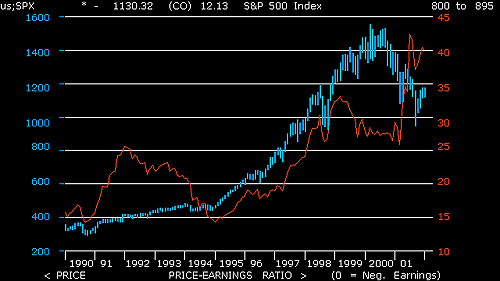
PE Ratio
is in Red (right axis)
In fact, for all the hoopla in the
stock market during the nineties, earnings could not keep up in
the first place. And now we're finding out about charges and other
things that are reducing current and future earnings.
At any rate, prices of things continue
to go up. Some at a faster clip, and some at a slower rate, and
others are declining. Credit continues to expand, and rising national
default rates ought to prove that there may be too much bad credit
issued. But instead we are told that deflation is the cause of the
rising incidence of default, and equally, the source of the pressure
on corporate profits.
To be sure, people who aren't using
the word (deflation) scientifically tell us this. In fact, all too
often they attach their own meanings to the word.
However, recall that at the appropriate
rate of interest whatever that is, there should be some sort of
balance between consumption and savings. An imbalance will cause
distortions in the structure of capital, which are likely to produce
lower profits, in due course. And if there is an imbalance it is
usually because there is intervention by the government. Either
the rate of interest is too high, or it is too low. If there is
too much bad credit, then that must mean the interest rate is too
low.
How do we know if there is too much
bad credit? Rising default rates suggest it, and falling profits
suggest it. How do we know if there is too much money? Rising prices
will suggest it, whether we are talking about the prices of commodities,
services, or assets.
Again, a market interest rate should
poise the interests of savings and consumption so that the factors
of production within society are arranged in an order maximizing
everybody's welfare. If imbalances occur between consumption and
savings, it is because the interest rate is too low, or too high.
We are not writing this to prove
that theory, for that has been done. It's just unknown by most of
Wall Street.
So because too much credit produces
rising default rates, and because an improper allocation of the
factors of production seems to be leading to poorer profits as well
as a rise in the ranks of the unemployed, is no reason to suspect
deflation. The cause of these problems is easily the agency that
allowed for too much money and credit in the first place.
In fact, analysts can look far and
wide and write eloquent essays on why deflation is coming, from
the mysterious forces of a Draconian winter to an explanation as
to why it is resulting in a rising foreign exchange value of the
dollar, but they will not actually find it. At least not in terms
of any of the fiat currency systems on earth, they won't.
There has not been deflation since
Roosevelt confiscated everybody's gold, period.
The subject of gold & money is neither
an old economy nor a new economy subject. Neither is the subject
any more a matter of that than is fashion, or politics.
It is, on the contrary, a matter
of economics, and in particular, capitalism. It is our protection,
as is OPEC the Mid East oil industry's protection, from monetary
and in particular, government chicanery. In order for Capitalism
to really flourish, all of the markets need to be free from intervention,
and certainly control.
But what so many analysts, reporters,
and anchormen cannot seem to do is find it fashionable to criticize
the government and other interventionists. Instead, they find deflation
symptoms, and "solutions" provided by whomever, as convenient enough
to criticize the government not for intrusion, but for not intervening
enough. Everyone requires more rate cuts because market discipline
is no longer fashionable.
Now, all that has happened is that
valuations have soared, and profits continue to shrink, as we keep
saying. The direct result of the Fed's intervention over the last
year has been to further distort the structure of capital, and promote
malinvestment, perhaps worsening the ultimate trough that profitability
sinks into.
But where is the deflation? How can
equity averages trade at a PE ratio of almost 30 times earnings
if deflation is here? How can interest rates be going up if deflation
is here? The breakdown in monetary systems does not result in deflation;
it results in more inflation, and more, and more. Look around at
the world today. It has been happening everywhere from Russia to
Asia to Argentina to South Africa, and now in Canada.
ROI Important
to Foreign Exchange Values
Trade rarely determines foreign exchange values. If it did the dollar
would always go down. Actually, they are determined in the same
way most markets are, by money flows.
We should know that America's chronic
trade deficit, which Mr. Greenspan dubs as the consequence of its
propensity to import, is offset by foreign investment flows. It
is true that "some" of this is seen in the capital accounts, but
clearly, we can explain the rising dollar better this way than by
deflation.
While such catallactics can pressure
certain domestic prices, that is not deflation. It is money, or
capital, flowing into the US seeking a relatively higher rate
of return.
Big difference, particularly when
the higher yields are fueled by a policy that seeks to maximize
consumption by artificially lowering certain interest rates. And
particularly when the resultant inflation manifests in racing asset
prices. This is what is causing the dollar to rise as we speak (write).
Have a look at the price to sales
ratios of various global markets below in order to derive an answer
to which one holds the highest set of expectations about the future
course of its own profits.
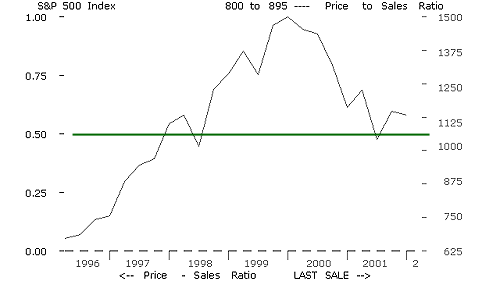
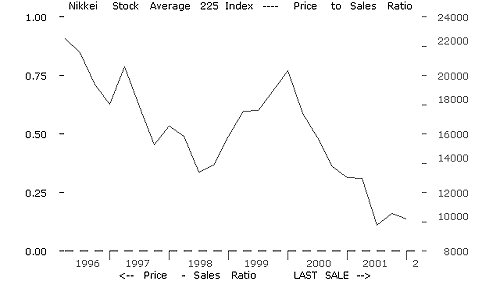
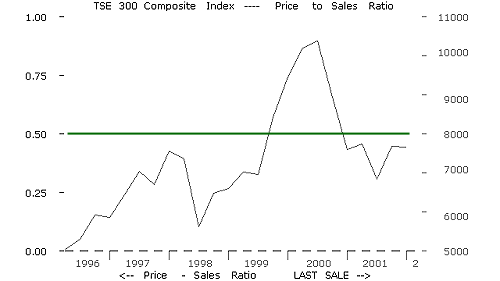
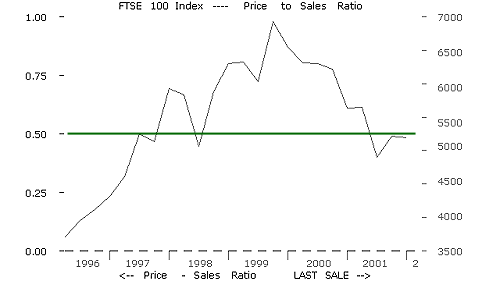
Source: Bridge.com
The higher the ratio, the more of
a premium investors place on each dollar, euro, or yen of revenues.
Clearly, investors in the American market expect better returns
on each sales dollar. This fact is implied in the relatively high
US bond yield.
Treasury yields have been rising
faster in the US than elsewhere, reflecting many things actually.
This is only one. But so long as stocks and consumption are on the
rise, this is the main implication of rising yields.
However, these aren't normal times,
and we're hearing nothing but how much supply bond dealers have
had to contend with. Thus, rising yields could also mean that too
much credit is being issued, more than lenders have, or are willing
to part with.
If this is the case, it really means
that bond yields are up due to inflation. Perhaps it is possible
that the lender's willingness has been compromised by his rising
exposure to bad credit?
Surely not restraining lenders is
a lack of liquidity to lend out. In fact, the unbridled expansion
in money supply is in all likelihood the real cause of the factors
that have led to the failures of many business models, and businesses
recently.
Thus, when stock markets implode
the incorrect solution is to throw more oil into the fire. There
is already enough oil, metaphorically (and actually as well perhaps).
It is possible that the correct solution is less oil, but admit
that I have no idea how to get there without getting burned (excuse
the bad humor).
In any case, the main point is that
by throwing more oil onto the fire, it will grow so that investors
(having also been burned) will continue to shrink the dollar investment
premium. This is more likely to result in a crack in the dollar
than deflation, if history is any guide.
Dollar Devaluation
is Inevitable
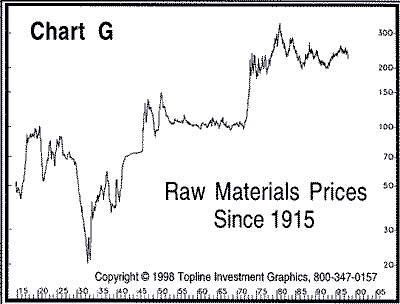
Source: Sharelynx.net
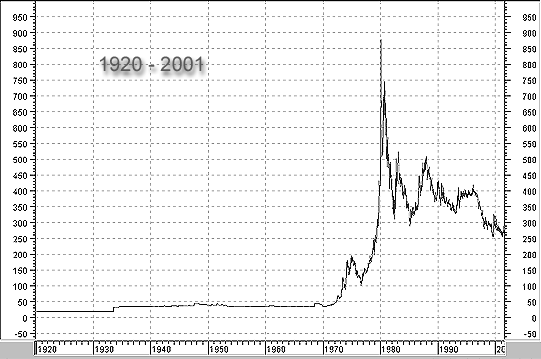
Source: Sharelynx.net
Never mind cumulative imbalances
in the Balance of Payments accounts of America, the only experience
in the Fed's history that came anywhere close to deflation was the
experience the entire world is trying desperately not to repeat.
That is the 1929 stock market crash and depression that arrived
shortly thereafter.
The dollar was backed by gold at
the time, and people were withdrawing whatever money they had on
deposit at financial institutions they weren't comfortable with,
for very good reason. Those institutions were part of the process
that created too much credit, and in turn, compromised their deposits.
In the end the only way that the
government could stop these bank runs was to make the greenback
non-convertible into gold. FDR called a bank holiday, and it was
now illegal to hoard gold. Then he devalued the dollar against gold.
That means that prices of things were rising despite massive unemployment
(note when the bottom arrived in Raw Materials prices in the chart
above).
The same occurred in the seventies,
with respect to prices and employment. Prices rose, and so did unemployment.
Yeah, it's a depression when people can't afford to buy things,
and when they're unemployed, regardless of what GDP says about the
economy. There certainly was no deflation.
Sure, while there was a gold link,
deflation was inevitable. But this meant only that any unnecessary
credit was forced into corrective liquidation, as opposed to compounded.
The monetary busts through all of history that seemed the worst
were the ones following the most rapacious (unrestricted) expansions
of money and/or credit.
Moreover, the gold link was compromised
(ineffective) because it had to coexist with the Federal Reserve
System, which only meant that the creation of credit could continue
without retribution, or without the market discipline that could
keep the system of money, and thereby the system of production,
sound.
In fact, the Fed found that the gold
link would result in bank runs regardless of its own existence,
because the public would lose confidence in its bank's balance sheet,
since the Fed existed so that banks could lend excess credit. The
coexistence of the FRB and the gold link lasted only from 1913 to
1933, twenty years.
Since its creation, the FRB has believed
that a free banking system supported by a lender of last resort
is the natural evolution of a gold standard. But it isn't, because
the gold standard that existed was not what we are talking about
today. That gold standard was already a government decree (lawful
money), not a product of the market. Ever since the day the government
fixed the bimetallic ratio in the mid 1800's, money in the
US was no longer a product of the market.
Naturally the evolution of the free
banking system, as we know it, succeeded that gold link. But all
that has been done by abandoning the link was to debase the currency.
They'd outlawed silver by 1873 and
gold by 1934, as backing for the dollar. This was not the result
of silver or gold being old economy ideas; on the contrary, it was
the straight line result of a debasement in the coin of the realm.
With a central bank, credit is now allowed to grow as long as lenders
and borrowers want, in theory. The current system of money is not
the natural evolution of a sound monetary system, on the contrary,
it is blatant corruption financed with the public trust. The market
that determines what money is, continues to exist.
Instead of bank runs, however, we
get dollar devaluations now. If a gold backed currency were legal
tender, we'd get bank runs, as depositors would withdraw their gold
the moment they lost confidence in their banks. But today it is
the banks, not us, which have a safety net: the Fed. That's our
money people; it's our public trust that they use to support their
bad investment policy with.
Of course, when I say we would always
get bank runs, I mean only to the extent that the banking system
is overly avaricious with the issue of notes in the first place.
Unfortunately, there is no other
way for us to protect our monetary system than by exercising the
right under the system of property, which allows us to own gold,
or whatever asset or commodity we think is the most secure (can
hold its value) and liquid (preferred by the market). By doing this
we secure the system of production known as capitalism, but by allowing
the expansion of money and credit to go on, is to sanction a transfer
of wealth and surrender capitalism to a system of production that
is based on government and producer sovereignty, rather than individual
(or consumer) sovereignty.
At any rate, we've spent enough time
in past articles debunking the deflation myth. From here on in we'll
just have to see. The point I want to make is that deflation occurs
as people hoard money balances. However, history again (never mind
logic) has shown that when this happens it isn't the dollar that
people perceive as money, it is gold.
So even while the New Economy falls
apart right before their eyes, analysts continue to show their faith
in the catalogue. Duh, this one is new economy, this one is old…
Unbeknownst to them, what they imply
by tossing gold out with the old economy is that the people at the
FRB offer a better money, one that we'll want to hoard when the
banking system goes the way of Japan's.
Alas, Japan, but don't they have
a deflation problem? Get off that already. No, they generally have
a rising currency problem, as a consequence of less relative inflation,
mainly. Defining deflation by movements in prices, which leads to
many mistakes, Japan does have relative deflation.
Remember that if America has the
propensity to import, Japan has the propensity to export. But it
has done more than export goods; it has exported its capital, as
has Canada, some European countries, and any nation that has a chronic
trade surplus with America. That is the main reason that the foreign
exchange value of the dollar ever rises, because most of the world
is engaged in competitive devaluation against it. However, in Japan's
case, rather than engage in competitive devaluations, they had targeted
certain export industries for maximum productivity, and either exported
their profits (savings) or allowed them to accumulate overseas.
The result is a surplus not only in trade, but also investment income.
In any case, when US led monetary
booms turn bust, they almost always result in the devaluation of
the US dollar against other currencies as their trading partner's
surplus capital is withdrawn. Indeed, dollar policy in our view
is all about maximizing the investment premium on the US dollar,
relative to other currencies, in order to make it attractive enough
to continue attracting net foreign capital flows.
Maximizing returns in this way is
superficial, and unsustainable. And it is in this way that the gold
debate is tied to the stock market debate. It is our contention,
as well as other's, that equity valuations are indeed superficial.
They are the consequence of a monetary boom (inflation) that is
likely to end like all the others if not worse, for the dollar anyway.
If we are correct, profits will continue to erode, and so will bank
balance sheets. Stock market valuations must eventually collapse
if this is true. The returns that seemed so high only a few years
ago will look increasingly negative.
When that happens, the investment
premium will shrink, and the incentive for the accumulation of dollar
assets should decline. That hasn't happened yet. Recall that we
do not measure this premium by the relative direction of
stock prices, but by their relative valuation compared with other
stock markets.
The steep yield curve and buoyant
market valuations are the only plausible reason that explains why
the dollar is still aloft, in our opinion.
When the system of inflation no longer
supports this superficial system of valuation, and it all breaks
down, deflation will not be the outcome. Dollar devaluation will.
Money
Monopoly is by Decree Only
What does all of this have to do with gold? Plenty. Remember, global
central banks have been selling their gold reserves over the past
decade. They have been selling so much of the stuff that the market
has become convinced the rest of their gold is also up for sale,
as if it was a surplus overhanging the market.
Concurrently, the market has also
become convinced that gold is from the old world, not something
that is useful today because (and there is only one because) of
the presumption that the dollar and Fed have replaced gold.
But neither gold nor the dollar nor
central banking is new. Neither are the characteristics of this
specific business cycle, new. They are old, each of them way more
than 200 years old.
What also is not new is that while
the government decrees lawful money, the market chooses real money.
History has already shown that outlawing gold will not prevent any
market's victory anymore than price controls will.
In fact, even while the IMF has outlawed
gold as legal tender in most of the world, it is still preferred.
Indeed, that is why it is outlawed.
Yet that hasn't dissuaded the Japanese
savings community from buying it. Despite the decree, and all the
noise of deflation, investment demand for gold is accelerating in
Japan. From the November issue of the World Gold Council's Demand
Trends:
Gold demand for jewellery and
personal investment responded to global events in Q3, both before
and after September 11. The slowdown in global economic activity
during the period and the volatile gold price after September
11 caused jewellery demand to fall 10% from year-earlier levels
to 649 tonnes. Meanwhile the increased global uncertainty following
the terrorist attacks caused a rise in safe-haven buying of investment
gold in a number of countries. This was particularly noticeable
in countries such as Japan, Korea, Vietnam, Thailand and USA with
lesser effects in a number of other countries. Together with the
issue of the Deutsche Mark commemorative coin, this pushed investment
demand to 106 tonnes, 17% higher than in Q3'00. Overall demand
for Q3 was 755 tonnes, 7% below year-earlier levels bringing demand
for the year to date to 2,356 tonnes, 2% below that for the first
three quarters of 2000. Demand surged in Japan rising 37% on the
back of a 91% increase in investment purchases.This trend to higher
investment was already evident before September 11 but was reinforced
by the global crisis. The weak economy resulted in a 7% fall in
jewellery demand but this was tempered by a continuing shift towards
yellow gold jewellery away from platinum - WGC; November 2001.
Last year, on the advice of Dr. Larry
Parks the World Gold Council wrote to the IMF requesting that they
reconsider their law. I haven't heard anything new yet, but can
you imagine the opposition?
Greenspan might be out of a job,
for one. Of course, we don't need to explain to you that we are
not talking about societies with citizens exchanging gold ingots
with each other. There is absolutely nothing wrong with paper or
other technology substituting for gold and/or silver.
But Mr. Greenspan et al currently
run a money monopoly. By depressing the rate of interest beyond
what the market might determine, they have allowed the issue of
an enormous amount of "lawful" money. So much so that a form of
Gresham's law has been invoked.
That is, the money the government's
decree has undervalued disappears from the market and the money
which the decree has overvalued remains (von Mises).
If central bank selling of gold,
or even just the decree, has not overvalued the dollar then why
has gold disappeared from circulation? That's a whole essay in itself.
The point we are trying to make here is that this money monopoly
is run by decree, and it is in constant conflict with the market
over what is, or isn't, money. It's not easy keeping a monopoly,
just ask Bill Gates.
Furthermore, the monopoly has produced
consequences that we argue will compromise the value of the dollar,
not only in terms of other fiat (money substitute) currency, but
also in terms of certain commodities, and particularly that one
commodity, which continues to provide the best liquidity (most widely
accepted) and holds its value through time.
It just happens to be the one commodity
outlawed for use as legal tender, anywhere in the world.
Western Government's have been keen
to outlaw gold ever since Marco Polo came back from his trip to
Asia with the first sample of paper money the West had ever seen.
Yet for one reason or another, they could never keep it outlawed
from the market. Markets develop whether they like it or not. Just
ask any Russian about that, or just look at the long-term gold chart
again.
In fact, we would argue that the
dollar could not survive if gold was made illegal to own, outright.
And we could also argue that is the reason the government does not
make it illegal to own gold today. Perhaps they have figured out
that it is better to let the dollar devalue gradually than suddenly.
Though the stubborn strategy of the Treasury in recent years in
guiding a mock strong dollar policy may prove that market induced
devaluations, sudden or gradual, are not even considered acceptable.
For those that will read this comment and go on with their merry
lives because they assume that alone means the dollar will go up
forever, I am surprised they got this far in the article.
Central Bankers will Buy Back
Every Ounce
Nonsense! That is absurd. Central
banks have no use for gold, and they're selling it in increasing
quantities at every chance they get. After all, the dollar has been
rising against gold, in value, over the past twenty years. They'd
be happy to sell it all.
Remember dollar policy - the superficial
maximizing of returns through inflation, and the fast-forwarding
of Gresham's Law? Inflation is a hidden tax because it taxes through
the debasement of currency, eventually.
By themselves, these facts have little
to do with gold, except to the extent that when the debasement becomes
visible and perceived, gold will be increasingly preferred. And
the more gold central banks sell at low prices, the more demand
they will beget (recall Say's Law), and the less valuable will become
their own currency.
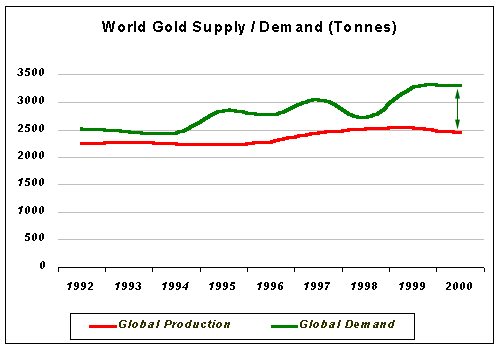
US Geological Survey / World Gold
Council
This is just a fact of life. To all
of those analysts who really believe that the world's central banking
cartels are not really interested in owning gold, we wish them well
and trust they will continue buying dollars as long as the Fed exists.
Note the gap between demand and supply above, charted as one series,
below:
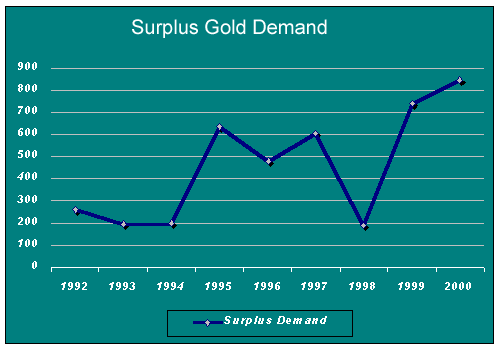
US Geological Survey / World Gold
Council
Now if there is one piece of evidence
that proves a market has been "intervened" with, and that stands
out like a sore thumb, it is the chart above. That's all we really
need.
The World Gold Council's estimates
for demand reveal that demand for gold in 2000 outpaced production
by more than 30%. The fact that central banks made up the difference
is inconsequential. This year's figures aren't in yet, but perhaps
part of the improving tone in the market suggests they will be hot.
What is important is that the more
gold sold too cheaply, the more consumers and investors will desire
to own it. So central banks may indeed be stoking demand by selling
their gold too low, if not with their poor fiat policies. And if
they truly do believe that they don't need any of their gold, all
that will happen is that they will continue to sell it, and stoke
even more demand, until one day the rising price and their empty
vaults turns them into buyers, or outright failures.
While producers haven't been able
to keep up with the demand, banks have. And if bankers sell their
gold (or gold they don't have) in the derivatives market, they turn
around and offer to buy the producer's forward gold at a liquid
contango, thereby spreading risk and finding a new (vested) partner
in crime, with the incentive.
The consequence of policy like this
is an overvalued dollar. Thus banks have been all too happy to sell
their gold reserves; to fetch more of these overvalued dollars.
However, since the biggest competitor
for gold is the dollar, while the dollar remains overvalued, gold
appears plentiful. Its scarcity will become apparent only when the
dollar begins to lose its value, or perhaps sooner. Perhaps the
swoon in currencies such as the Canadian dollar, Euro, the Yen,
and Argentine Peso will spur investment demand for gold, as is the
case in Japan at the moment.
That said if and when the dollar
begins to lose value (early this year I suspect) there will be many
problems of scarcity to contend with that haven't even been considered
yet. In fact, if you've come far enough to understand why Greenspan
cannot replace gold with anything at the Fed, and that gold is the
(decreed) dollar's free market competition then it isn't a big leap
to grasp how the declines in currencies such as the South African
Rand, Canadian Dollar, and Aussie dollar conveniently bring more
gold supply to the market.
It has gotten to the point where
the Australian gold industry is handicapped because its producers
have been selling forward so much of their future production for
rising dollars, and for liquid contangos (under the assumption that
gold prices will stay weak).
South Africa and Australia are two
of the worlds top three gold producers, together contributing 30%
to global gold production. The United States, which is second, has
a 13% market share, approximately.
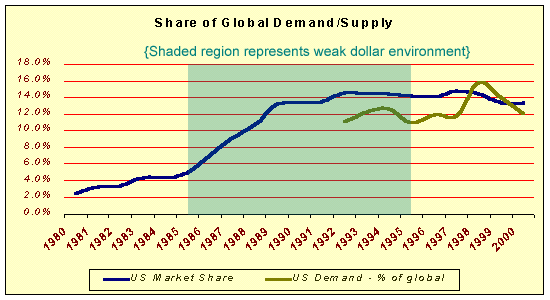
US Geological Survey
However, note in the chart above,
when the dollar trends down the world becomes more dependent on
production in the US, and vice versa, when the dollar trends up,
market share rises outside of America. This is under the notion
that a rising value in the domestic currency reduces the incentive
to produce gold, so production rates are stoked by a falling currency,
and they are restricted by a rising currency. These
differences may have been marginal in the past.
However, hampered with big hedge
books now and a potential turn down in the US dollar, what will
happen to production in South Africa, Australia, and Canada, if
those currencies rise in relation to the devaluing dollar?
A rise in the currencies of gold
producing nations is likely to dissuade production just as the rise
in gold prices is likely to discourage forward selling. Worse, if
producers have already forward sold a lot of their in ground gold,
cheaply.
And it could be even worse (for gold
supply) if the entire North American exploration infrastructure
is disabled. It is you know. The mining exchanges on the Canadian
west coast are gone. The cost of exploration must be born by the
industry now, and we all know how slow that is to start up. Maybe
the Nasdaq will pick up the slack.
At any rate, it is possible that
a reversal of the dollar could herald a problem of scarcity like
nothing we have ever seen. Nothing that even could be compared with
in the oil business.
As a consequence of both dollar (investment)
policy and the willingness of nations to enter into persistent competitive
devaluations against it then, banks and producers have sold way
too much of their gold, unless they are right in the end - that
Alan Greenspan has created the ultimate money, which is liquid,
holds its value, and that everyone will always prefer. Or heck,
if they don't, he'll change it so they do.
I suspect that the market is catching
on. And just because everyone else disagrees, still, is the biggest
reason to be bullish, in this case (as opposed to a blind contrarian
call). This is not simply a case of, "geez, the market is so low
I have to be bullish." We leave that for the New Economy's techno-mavens
on the Nasdaq.
Governments (in this kind of economic
system - Inflationism) can only hold back the price of this metal
as long as they can produce a positive return on the dollar, and
so long as they can sustain expectations that financial assets will
outperform the bulk of the commodity complex, over the long term.
The FRB can sustain this for some
time by maximizing consumption at the expense of savings under the
mandate of a full employment doctrine so long as problems that will
ultimately surface such as declining profits can be postponed. This
is happening now; the declining profits part. Remember, too much
credit creates too much bad credit.
Recall, too much money has distorted
the structure of capital, thus the factors of production, which
leads to all sorts of economic problems.
The result of monetary policy in
2001 therefore was a worsening of this condition. And it is likely
to continue worsening until the corrective forces of the market
are able to heal the economy. This can't be accomplished by "short
cuts" through interventionism, or apathy for the market, which can
only worsen the condition by further shifting the factors of production
away from producing the correct order of capital.
To believe otherwise, that interventionists
can arrange the proper order of capital, is just not born out in
the historical record.
However, be that as it may, gold
and gold shares have been trading well, indicating perhaps that
some corrective forces may already be on their way.
Propaganda notwithstanding, there
is little sign of real recovery, and markets may be realizing that
when the Fed is forced to reverse interest rates, it'll be like
a tail wind for the invisible hand.
It's
Different This Time
Normally, gold prices and gold stocks rise in front of a stock market
accident. They didn't this time. Furthermore, last year's move up
off of 15 year lows, while better than most, wasn't spectacular.
But what happens "normally" when the stock market falls? It usually
takes this sector down with it. Possibly, this time around, investors
have learned (markets train us you see) not to jump in before a
crash.
Some investors could be thinking
that since the gold market hasn't turned up yet, the bull market
in most stocks is still on, and that gold shares are going to move
up now, along with the Dow's last leg, I presume. I think that is
precisely wrong, because their expectations could cause them to
panic if the Dow turns down "prematurely."
The same expectations in prior years
were reversed due to this mistake. I think we have to expect the
worse, in this case a stock market crash. However, the evidence
that I can report to you (as an observer of the market action in
all of these stocks) is that it is an increasingly exciting phenomenon
to watch gold shares rise on the days when broader market averages
look particularly vulnerable.
Perhaps also holding back gold bulls
this time around is that the Reg Howe versus B.I.S. action seems
to be hanging over the market because of the uncertainty about what
Mr. Ashcroft hasn't said yet. But that
can be bullish. I'd hate to see a rally get caught because the case
is thrown out of court.
Still, what I am increasingly perceiving
is a persistently more bullish tone in the gold market where stock
prices are getting away from investors waiting for just one more
dip, or new low in gold prices. If accurate, it's a terrific sign
because the market is full of skeptics.
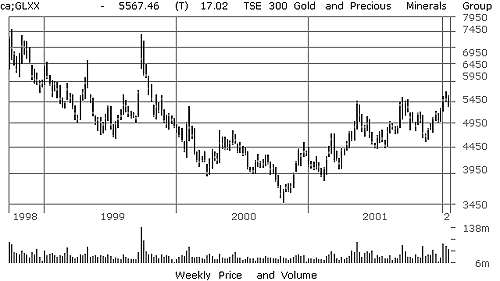
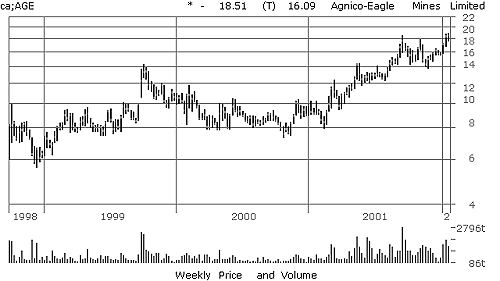
Source: Bridge.com
Although the inexperienced might
find widespread skepticism reason enough to stay out of the gold
market, we know better. We know, for instance, that if it goes up
and up and up, most people will eventually become bullish. The skeptics
will become fodder for the bull market.
What I'm getting at is that if the
market can grind its way up without any support at all, from the
mainstream, then what will it do when people really turn bullish?
Every turn down in gold shares this
year scared investors away. To me this is a sign that it is still
early. But it is more than that, the timing is improving - the turndowns
continue to reverse faster and from higher ground than we expect,
and the gains look particularly impressive on days that the broad
market sells off ominously.
Still, while fundamentals for gold
have been improving for several years, its prices, and those of
the producers' equities, have been lagging those developments.
Another key difference between this
cycle and others is that in the eighties and the seventies the dollar
had turned down before the stock market fell.
This hasn't happened yet, and in
all likelihood it hasn't happened yet because of how far the FOMC
has gone to support reckless stock market valuations with the interest
rate lever, and how far the Treasury has gone to ensure the valuations
aren't eroded by break away nominal prices. But because of how far
they have gone this time, when it does happen, meaning when the
dollar and stock market do fall, it might be much harder to stop
the decline than in prior bust sequences through the 19th century.
Raising interest rates while profits
and stock prices are falling could pose a political problem for
the boys at the FRB. Their only hope is that profitability on Wall
Street, at least, comes back before they have to reckon with rapidly
falling share prices.
Will
profits come back?
If we are supposed to believe that by adding more money and credit
to an economy already suffering from too much of it, and moreover,
if we are to believe that by engaging the government in larger spending
programs, America will become more profitable, then we are truly
in a New Economy.
The simple fact that so many people
do believe just that is scary all by itself. Indeed it is about
as scary as the belief that by fueling consumption, the central
bank can reinvigorate the capital spending incentive. Such perceptions
are not scientific in the slightest bit.
Earnings are still coming in, but
so far they've been nothing short of dismal. Beneath every headline
number, which already tends to represent a fall in profits, or sales,
or both, there is more bad news. But because analysts spent the
past year reducing forecasts, when the headline arrives it still
matches or beats expectations (if they've been beating it's been
marginal for the most part).
Expectations for a recovery in profits
are imbedded in signals coming from leading indicators that are
themselves influenced by expectations (stock averages as well as
surveys play big roles in many leading indicators). I suppose, though,
if participants are under the impression that confidence alone can
run an economy, my questioning of these models is moot, at least
until they are proven wrong.
Nonetheless global stock averages
are inarguably overbought, by many measures. Investors were anticipating
signs of recovery to show up in the fourth quarter reports. But
all they're getting is the same old Wall Street hoopla about how
earnings are down because of this or that, but they've met or beat
deflated expectations (the only place you'll find deflation is in
their egos).
Still, while they may be meeting
or beating most headline forecasts, expectations are much higher.
If investor expectations were only equal to the lowered forecasts,
stock valuations would be much lower.
Expectations are indeed high, the
stock market is indeed overbought, and valuations are certainly
not sustainable. All of these could be considered as compliments
of the Federal Reserve's monetary policies.
So what's the Fed going to do this
week? Who really cares? It's moot, because even if it reduces interest
rates, all that will happen is that valuations are buoyed a little
bit longer, while earnings continue to fall apart. And that's the
good news. The bad is that prices of important commodities begin
to rise, as they've been threatening to.
What's worse is that it might not
work. In fact, probably will not work. Confidence is waning, and
before the fourth quarter reporting period is out, my guess is that
it will be eroding. And if it doesn't work, look out below.
There are enough smart people out
there to know to take any rate cut as a selling opportunity now.
They've been trained by the bear market to do just that.
If I were a gambling man I'd guess
there will be another rate cut, based on the observation that expectations
for a rate cut are being played down. The FOMC has the element of
surprise in its corner this way. If they don't make a move, my guess
is that will pull the hope carpet out from underneath investor's
feet.
Should they move to raise interest
rates, with the declining trend in earnings, lofty dollar, and extended
valuations, the Fed risks blame for a stock market crash.
However, as crazy as it may sound,
from a strategic point of view, that could work to their advantage
for two reasons: they could keep their central role in the scheme
of things because people would believe that if it was possible for
the institution to bring the stock market down, it is possible for
it to lead it up. Second, they would fire up the populist criticism
that it should have provided more money, or lower interest rates,
thereby setting up the next cycle, if you will.
It's crazy because the political
and socioeconomic result is not predictable. However, that hasn't
stopped them before, and further, it may be their only option -
to at least lead the yield markets higher. But it's more than crazy,
it would take big courage, or if not courage, desperation.
Conclusion
We've reached a critical stage where it is increasingly clear that
there is no amount of money that can reverse a bear market (in equities).
I think investors are beginning to realize that, and that is indeed
what the gold market is all about today.
If we consider a meltdown in implied
and expected real return (expectations) for the dollar as the catalyst
that will put the gold market into orbit, we can estimate several
sources of investment demand that will grow and fuel a bull market,
including central banks that choose to buy back their gold with
too many dollars, individual investors exchanging their dollars
for gold (or gold stocks), producers busy reversing their hedges,
and the hundreds of mutual funds seeking to hedge their portfolios
(rather than outright liquidate them) with a stable asset.
Furthermore, a breakdown in the dollar
would probably create a break away in most prices of goods that
pundits refer to as inflation. We have already discussed how the
(superficial) strong dollar policy of the Treasury has contributed
to shortages becoming increasingly apparent in many of the commodity
markets.
Finally, forget about the lease rate
when trying to understand supply in the gold market. I cannot understand
the significance analysts place on lease rates, despite the fact
that most arrangements are made over longer periods than the short
term leases most widely reported (usually one year or less), and
notwithstanding the fact that the WGC has already said that ninety
percent of leasing liquidity has dried up, since the signing of
the Washington Agreement in 1999.
The main thing that can be concluded
by looking at supply and demand trends is that the price of gold
is probably way lower than the free market would put it.
Combined with the extremely low exploration
incentive over the past decade, as well as other supply issues,
and add to that a potential down turn in the foreign exchange value
of the dollar as the American investment premium (dollar policy)
deteriorates, gold prices are set to light up the sky. I do not
mean it sarcastically that when we see bullish gold market commentary
by a Bloomberg, or CNBC analyst, it will be time to consider selling.
And at this point, even if we're
wrong about all the other commodities, as well as the foreign exchange
rate of the dollar, unless we are wrong about stocks and the overall
economic outlook then gold should still outperform the dollar. For
the only way that the foreign exchange value of the US dollar can
appreciate, in our view, is if trading partners allow further competitive
devaluations in their currencies.
But nations cannot live on trade
alone. Rapid investment outflows are undesirable, as are rapidly
rising prices, stoked through currency debasement. Every Argentina
is a reminder of that. And every Argentina is increasingly creating
new investment demand for gold.
If policies like this continue to
be pursued in Canada or Europe, particularly as the value of assets
decline or don't keep up with increases in nominal prices, and as
well, while the investment premium on US dollars shrinks, investment
demand for gold is sure to grow.
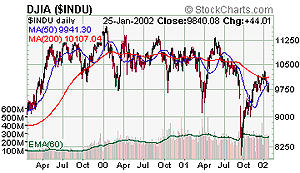 |
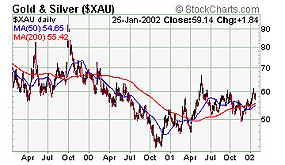 |
| Dow Industrials |
XAU Gold Mining Index |
Note the rhythm in both markets above.
There has been no real bounce in the Dow, other than just that,
a bounce. The tempo of this trend should come through - lower lows
and lower highs. What could possible happen to reverse this rhythm
now? What could happen to get the Dow to rally to 11000? Nothing,
in our view.
The Dow is headed for 7000, or lower.
It may bounce then, but my guess is that gold and gold shares will
be a lot higher by then, and the reasons for them to be higher will
become increasingly clear to the skeptics loathing the opportunity
today.
Good luck,
Edmond J. Bugos
The GoldenBar Global Investment
Climate is not a registered advisory service and does not
give investment advice. Our comments are an expression of opinion
only and should not be construed in any manner whatsoever as recommendations
to buy or sell a stock, option, future, bond, commodity or any other
financial instrument at any time. While we believe our statements
to be true, they always depend on the reliability of our own credible
sources. Of course, we recommend that you consult with a qualified
investment advisor, one licensed by appropriate regulatory agencies
in your legal jurisdiction, before making any investment decisions,
and barring that, we encourage you toconfirm the facts on your own
before making important investment commitments.
|

